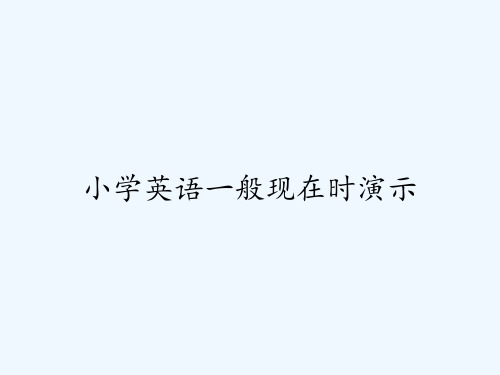英语一般现在时教学课件.ppt
合集下载
英语时态8种基本时态讲解.ppt课件

4)动词过去式变化规则。 a)一般情况下的词加-ed. work---worked call----called b)以不发音的字母e结尾的单词直接加-d . live----lived change----changed smoke----smoked die----died graduate----graduated drive----drove
8.过去完成时 表示动作发生在过去某一时间之前已经完成的动作或状态, 强调“过去的过去”, 常与 by the time, by the end of…,before , by 等引导时间的状语连用。
基本结构 主语+ had + 动词过去分词 + 其他成分 When I got to the cinema yesterday the film had begun already. He had learned English before he came here.
现在完成时与一般过去时的区别: 1)现在完成时侧重于对现在的影响;而一般过去时侧重于某一动作发生在过去某个时间或某段时间。即现在完成时侧重于现在的结果,而一般过去时侧重于动作发生的时间。例如:
I have seen the film. 我看过这部电影。(现在我仍记得电影的内容) I saw the film three days ago. 三天前我看了这部电影。(强调是三天前,而不是别的什么时候看的电影)
be going to含有“打算,准备”的意思,而will则没有这个意思, She is going to lend us her book. He will be here in half an hour.
be about to+V.原形(意为马上做某事,在时间上指最近的将来) I am about to leave school. 不能与表示时间的副词连用。 They are about to set out.(√) They are about to set,变y为i加-ed. study----studied carry----carried cry----cried try----tried d)以元音字母+y结尾的单词直接加-ed. play----played stay----stayed
8.过去完成时 表示动作发生在过去某一时间之前已经完成的动作或状态, 强调“过去的过去”, 常与 by the time, by the end of…,before , by 等引导时间的状语连用。
基本结构 主语+ had + 动词过去分词 + 其他成分 When I got to the cinema yesterday the film had begun already. He had learned English before he came here.
现在完成时与一般过去时的区别: 1)现在完成时侧重于对现在的影响;而一般过去时侧重于某一动作发生在过去某个时间或某段时间。即现在完成时侧重于现在的结果,而一般过去时侧重于动作发生的时间。例如:
I have seen the film. 我看过这部电影。(现在我仍记得电影的内容) I saw the film three days ago. 三天前我看了这部电影。(强调是三天前,而不是别的什么时候看的电影)
be going to含有“打算,准备”的意思,而will则没有这个意思, She is going to lend us her book. He will be here in half an hour.
be about to+V.原形(意为马上做某事,在时间上指最近的将来) I am about to leave school. 不能与表示时间的副词连用。 They are about to set out.(√) They are about to set,变y为i加-ed. study----studied carry----carried cry----cried try----tried d)以元音字母+y结尾的单词直接加-ed. play----played stay----stayed
小学英语一般现在时演示 PPT

3、She gets up at six、
主语+v(原形或es/s)+其他。
返回
当主语是第三人称单数时,动词需变化、 动词单三得变化: 1、一般情况下,直接加s,如:
reads, plays, works, makes 2、以s, x, ch, sh结尾,后加es、 如:watches 3、以辅音字母加o结尾,一般加es ,如:does, goes 4、“元音字母+y”结尾得单词,直接在词尾加-s。
B、 否定句:主语+don’t/ doesn’t+动词原 形+其他。 I study English every morning、 I don’t study English every morning、
We speak Chinese、 We don’t speak Chinese、
Jim likes playing football、 Jim doesn’t like playing football、
You are thirteen、
☺否定句:主语+ be+ not+其它
如: He is not a worker、
You aren’t thirteen、
☺一般疑问句:Be+主语+其它?
如: Is he a worker? Yes, he is、/No, he isn’t、
Are you thirteen? Yes, I am 、/No, I am not、
☺一般疑问句:
Be+主语+其它?
返回
一般现在时(实意V一般疑问句)
1、I go to school by bus、 疑问句: Do you go to school by bus、 2、He goes to school by bus、 疑问句: Does he go to school by bus、
一般现在时ppt讲解ppt课件

烧伤病人的治疗通常是取烧伤病人的 健康皮 肤进行 自体移 植,但 对于大 面积烧 伤病人 来讲, 健康皮 肤很有 限,请 同学们 想一想 如何来 治疗该 病人
三、单数可数名词或"this / that / the+单数可数名词"作主 语时,是第三人称单数。
A panda is a shy animal. 熊猫是害羞的动物。 This book is yellow. 这本书是黄色的。 That car is red. 那辆小汽车是红色的。 The cat is black. 这只猫是黑色的。
烧伤病人的治疗通常是取烧伤病人的 健康皮 肤进行 自体移 植,但 对于大 面积烧 伤病人 来讲, 健康皮 肤很有 限,请 同学们 想一想 如何来 治疗该 病人
一般现在时 (否定句)
1、I go to school by bus. 否: I don’t go to school by bus. 2、He goes to school by bus. 否:He doesn’t go to school by bus.
烧伤病人的治疗通常是取烧伤病人的 健康皮 肤进行 自体移 植,但 对于大 面积烧 伤病人 来讲, 健康皮 肤很有 限,请 同学们 想一想 如何来 治疗该 病人
用一般现在时态描 述下your good friend ——Mike
烧伤病人的治疗通常是取烧伤病人的 健康皮 肤进行 自体移 植,但 对于大 面积烧 伤病人 来讲, 健康皮 肤很有 限,请 同学们 想一想 如何来 治疗该 病人
烧伤病人的治疗通常是取烧伤病人的 健康皮 肤进行 自体移 植,但 对于大 面积烧 伤病人 来讲, 健康皮 肤很有 限,请 同学们 想一想 如何来 治疗该 病人
一般现在时 (否定句)
七年级一般现在时课件PPT

示例
Do you like apples? 你喜 欢苹果吗?
Am/Is/Are引导的一般疑问句
01
结构
Am/Is/Are + 主语 + 其他?
02
用法
用于询问对方或第三方的身份、特征或状态,其中Am用于第一人称单
数,Is用于第三人称单数和不可数名词,Are用于其他人称和复数。
03
示例
Are they your friends? 他们是你的朋友吗?
用所给动词的适当形式填空
2. My father _______ (work) in a bank. He _______ (go) to work by bus every day.
07
总结回顾与拓展延伸
重点内容回顾
01
02
03
04
一般现在时的定义:表示经常 性、习惯性或普遍性的动作或 状态,以及客观真理或事实。
示例与练习
示例
What do you usually do on weekends? 你周末通常做什 么?
练习
根据所给情境,构造特殊疑问句并给出相应回答。例如,针 对“我昨天去了图书馆”这一情境,可以构造特殊疑问句 “Where did you go yesterday?”并回答“I went to the library yesterday.”。
示例与练习
示例:将陈述句“He likes
playing basketball.”改为一
般疑问句。
01
答案:Does he like playing
basketball?
02
练习:将以下陈述句改为一般
疑问句。
03
She has a new bike.
一般现在时课件ppt

形式
动词采用一般现在时形式 ,即动词原型或第三人称 单数形式。
一般现在时的特点
普遍性
一般现在时适用于描述普 遍存在的现象、事实或习 惯性动作。
客观性
一般现在时强调动作或状 态的客观存在,不受时间 限制。
习惯性
一般现在时用于描述习惯 性、规律性的动作或状态 。
一般现在时的用法
描述现在的动作和状态
描述普遍存在的现象和事实
选择题练习
总结词
选择题练习是一种常见的练习方式,通过提供多个选项,让学生根据语境选择正 确的答案,进一步巩固一般现在时的用法。
详细描述
在选择题练习中,教师可设计多个选项,每个选项对应不同的动词形式。学生需 要根据句子语境,选择符合时态要求的正确答案。例如,“Do you like to ___(swim/play) in the pool?”,正确答案应为“swim”。
翻译练习
总结词
翻译练习是一种跨语的练习方式,通过将句子从一种语言翻译成另一种语言,让学生更好地理解和运用一般现 在时。
详细描述
在翻译练习中,教师可提供一些英文句子,要求学生将其翻译成中文。在翻译过程中,学生需要准确把握时态的 转换和应用,确保译文符合中文表达习惯。例如,“He ___(live) in New York.”,正确译文应为“他住在纽约 。”
详细描述:一般现在时表示动作或状态的一般情况,不 强调正在进行的动作;而现在进行时则强调正在进行的 动作或正在变化的状态。
详细描述:一般现在时通常用于描述事实、习惯或目前 的状态,而现在进行时则用于描述正在进行的动作或正 在变化的状态。
详细描述:在描述当前情况、事实或习惯时,一般现在 时更为适用;而在描述正在进行的动作或变化的状态时 ,现在进行时更为合适。
一般现在时态ppt课件.ppt

10
当主语不是第三人称单数时 :
I get up at 6:35 in the morning.
否定句:
I do not (don't) get up at 6:35 in the morning.
一般疑问句: 肯定回答: 否定回答:
Do you get up at 6:35 in the morning? Yes, I do.
主系表
4. They are from China.
5. Jim is under the tree.
6. My English teacher is kind, but sometimes he is strict.
3
单句改错
? 1. They are come from Canada. (A去掉are或come)
? 1. I _a_m__ a teacher. ? 2. Mary __i_s_ my friend. ? 3. We _a_r_e_ under the tree. ? 4. They _a_re__ swimming in the river. ? 5. _I_s _ he your cousin? ? 6. Jim and I _a_r_e _ from the UK. ? 7. _A_r_e_ you Jim's parents? ? 8. My mother __is__ beautiful.
B
C
(A改为Does)
? 5. We like watch TV in the evening. (B改为watching TV)
?
A
B
C
4
一般现在时:
表示现在的状态、经常的或习惯性的动作、表示主语 具备的性格和能力等。 时间 状语有:always, usually, often , sometimes, never, every day, on Mondays/ Sundays 等。 一般现在时的构成: 肯定句:
当主语不是第三人称单数时 :
I get up at 6:35 in the morning.
否定句:
I do not (don't) get up at 6:35 in the morning.
一般疑问句: 肯定回答: 否定回答:
Do you get up at 6:35 in the morning? Yes, I do.
主系表
4. They are from China.
5. Jim is under the tree.
6. My English teacher is kind, but sometimes he is strict.
3
单句改错
? 1. They are come from Canada. (A去掉are或come)
? 1. I _a_m__ a teacher. ? 2. Mary __i_s_ my friend. ? 3. We _a_r_e_ under the tree. ? 4. They _a_re__ swimming in the river. ? 5. _I_s _ he your cousin? ? 6. Jim and I _a_r_e _ from the UK. ? 7. _A_r_e_ you Jim's parents? ? 8. My mother __is__ beautiful.
B
C
(A改为Does)
? 5. We like watch TV in the evening. (B改为watching TV)
?
A
B
C
4
一般现在时:
表示现在的状态、经常的或习惯性的动作、表示主语 具备的性格和能力等。 时间 状语有:always, usually, often , sometimes, never, every day, on Mondays/ Sundays 等。 一般现在时的构成: 肯定句:
初中英语一般现在时学习课件(共25张ppt)

Watch TV
I often ( ) TV at 8:00.
my father and I go swimming every sunday
My father and I ( ) swimming every Sunday
we play football every Wednesday
We ( ) football every Wednesday.
•9、要学生做的事,教职员躬亲共做;要学生学的知识,教职员躬亲共学;要学生守的规则,教职员躬亲共守。2021/8/312021/8/31Tuesday, August 31, 2021 •10、阅读一切好书如同和过去最杰出的人谈话。2021/8/312021/8/312021/8/318/31/2021 7:50:25 AM •11、只有让学生不把全部时间都用在学习上,而留下许多自由支配的时间,他才能顺利地学习……(这)是教育过程的逻辑。2021/8/312021/8/312021/8/31Aug-2131-Aug-21 •12、要记住,你不仅是教课的教师,也是学生的教育者,生活的导师和道德的引路人。2021/8/312021/8/312021/8/31Tuesday, August 31, 2021
• You have to believe in yourself. That's the secret of success. 人必须相信自己,这是成功的秘诀。
•
Exercise
• 8.I ( ) a boy. • 9.You ( ) a girl. • 10.He ( ) a teacher.
Homework(家庭作业)
1.将所学内容重新看一遍。 2.当一回小老师,给爸爸妈妈讲解什 么是一般现在时。Fra bibliotek是辅音字母
人教版初中英语七年级上册第四单元《一般现在时》语法教学PPT课件

肯定变否定,be后加not
01 概念与用法
一般疑问句结构变化
Are you a good person? Is she/he a good person.
肯定句变一般疑问句,只需将 be动词提前
行为动词 的一般现在时是怎么构成的呢?
01 概念与用法
观察下列句子
1、I play football every day . 2、You play football every day . 3、My friends play football every day . 4、He plays football every day . 5、Tom plays football every day . 6、My brother plays football every day .
01 概念与用法
第三人称单数变化规则
一般动词后加-s。 like--likes He likes playing basketball.
以辅音字母+y结尾的单词, 变y为i,再加-es。 study--studies He studies English very hard.
以s、x、ch、sh结尾,后加es。 watch--watches My father watches TV every night.
Part. five
课后作业
改错题 1.Our English doesn’t likes music. 2. Tony goes always to school at eight o’clock. 3. Does your parents like watching TV? 4. Lily haves lunch at school. 5. My sister doesn’t her homework every .
01 概念与用法
一般疑问句结构变化
Are you a good person? Is she/he a good person.
肯定句变一般疑问句,只需将 be动词提前
行为动词 的一般现在时是怎么构成的呢?
01 概念与用法
观察下列句子
1、I play football every day . 2、You play football every day . 3、My friends play football every day . 4、He plays football every day . 5、Tom plays football every day . 6、My brother plays football every day .
01 概念与用法
第三人称单数变化规则
一般动词后加-s。 like--likes He likes playing basketball.
以辅音字母+y结尾的单词, 变y为i,再加-es。 study--studies He studies English very hard.
以s、x、ch、sh结尾,后加es。 watch--watches My father watches TV every night.
Part. five
课后作业
改错题 1.Our English doesn’t likes music. 2. Tony goes always to school at eight o’clock. 3. Does your parents like watching TV? 4. Lily haves lunch at school. 5. My sister doesn’t her homework every .
一般现在时(示范课)ppt课件精选全文

精选课件
27
• 3. Daniel enjoys playing computer games.
• (改为一般疑问句并做肯定回答)
Does Daniel enjoy playing computer games?
Yes, he does.
精选课件
28
补充:some、any
• 一般说来,some 用于肯定句中,any 用于 否定句和疑问句中 。
Change the following sentences after the models.
Model 1: I like fish. (meat) I don’t like meat.
Model 2. He likes reading. (writing) He doesn’t like writing.
改疑问句或否定句时,原句里的some要改成any
There are some books on the desk. (改为否定句)
→There aren’t any books on the desk.
→Are there any books on the desk?
精选课件
29
Why not buy some apples? 为什么不买些苹果呢?
精选课件
26
句型转换
• 1. Mr. Green comes from Shanghai. • (改为一般疑问句)
Does Mr. Green come from Shanghai?
• 2. Millie lives in a flat in Beijing. • (改为否定句)
Millie doesn’t live in a flat in Beijing.
一般现在时讲解课件ppt

• 5.She has lunch at home. She doesn’t have lunch at home. Does she have lunch at home?
经营者提供商品或者服务有欺诈行为 的,应 当按照 消费者 的要求 增加赔 偿其受 到的损 失,增 加赔偿 的金额 为消费 者购买 商品的 价款或 接受服 务的费 用
• 3) 用于格言或警句中。 • 例如: • Where there is a will, there is a way.有志者
事竟成。
• 4) 用于表示现在时刻的状态、能力、性格、 个性。
• 例如:
• She is a good girl and always help others. 她是一个好女孩,经常帮助别人。
• (2) 当句子中即没有be动词,也没有情 态动词时,则在主语前加助动词do, does 变成问句;在主语后谓语动词前加助动词 don’t, doesn’t变成否定句,助动词后的谓 语动词要变成动词原形。
经营者提供商品或者服务有欺诈行为 的,应 当按照 消费者 的要求 增加赔 偿其受 到的损 失,增 加赔偿 的金额 为消费 者购买 商品的 价款或 接受服 务的费 用
___________________________________________________
经营者提供商品或者服务有欺诈行为 的,应 当按照 消费者 的要求 增加赔 偿其受 到的损 失,增 加赔偿 的金额 为消费 者购买 商品的 价款或 接受服 务的费 用
(3)以“辅音字母加 - y”结尾的动词,要先变y为i 再加-es.
try---tries study---studies cry---cries fly--flies 2.不规则变化:be---- is have----has
经营者提供商品或者服务有欺诈行为 的,应 当按照 消费者 的要求 增加赔 偿其受 到的损 失,增 加赔偿 的金额 为消费 者购买 商品的 价款或 接受服 务的费 用
• 3) 用于格言或警句中。 • 例如: • Where there is a will, there is a way.有志者
事竟成。
• 4) 用于表示现在时刻的状态、能力、性格、 个性。
• 例如:
• She is a good girl and always help others. 她是一个好女孩,经常帮助别人。
• (2) 当句子中即没有be动词,也没有情 态动词时,则在主语前加助动词do, does 变成问句;在主语后谓语动词前加助动词 don’t, doesn’t变成否定句,助动词后的谓 语动词要变成动词原形。
经营者提供商品或者服务有欺诈行为 的,应 当按照 消费者 的要求 增加赔 偿其受 到的损 失,增 加赔偿 的金额 为消费 者购买 商品的 价款或 接受服 务的费 用
___________________________________________________
经营者提供商品或者服务有欺诈行为 的,应 当按照 消费者 的要求 增加赔 偿其受 到的损 失,增 加赔偿 的金额 为消费 者购买 商品的 价款或 接受服 务的费 用
(3)以“辅音字母加 - y”结尾的动词,要先变y为i 再加-es.
try---tries study---studies cry---cries fly--flies 2.不规则变化:be---- is have----has
超详细一般现在时讲解ppt课件

→ Can you swim? → I can not swim.
3、 当句子中即没有be动词,也没有情态动 词时,则在主语前加助动词do, does变成问 句;在主语后谓语动词前加助动词don’t, doesn’t变成否定句,助动词后的谓语动 词要变成动词原形。
例:We get up at 7:00 every morning.
初中英语说课稿
一般现在时
八 大
一般过去时 一般将来时 现在进行时
时 现在完成时
态 过去进行时
过去将来时
过去完成时
一般现在时
一、掌握含有be动词的一般现在时的结构。
二、掌握含有实义动词行为动词)的一般现在时的结构。
在含有实义动词的一般现在时中,如果主语是三单,(谓语)动词也要用三单式。
一、一般现在时的基本用法
学生常见错误如下:
(一)be动词与行为动词同时出 现在句子中
(二)单三人称形式易出错 (三)在句式变换时易出错 (四)对do的理解易出错 (五)对主语的数判断有误
(一)be动词与行为动词同时出现在句 子中
(二)单三人称形式易出错
1、 He plaies (play) football very well. 以元音字母加y结尾的动词变单三人称形式 不能把y换成i再加es; 2 、Danny gos (go) to school at 7:10. 与名词变复数不同,变单三人称形式以o结尾
eighteightminusfivethreeminusfive77动词三单式的变化规则动词三单式的变化规则规则变化规则变化一般情况下直接一般情况下直接sworkworkworksaskworksaskasksseeasksseeseesseeschshchsh结尾结尾eseswatchwatchwatchesgowatchesgogoesdogoesdodoeswashdoeswashwasheswashes以辅音字母以辅音字母yy结尾变结尾变yy为为ii加加esestrytrytriesstudytriesstudystudiesflystudiesflyfliesflies不规则变化不规则变化havehavehashas88三一般现在时的句型转换三一般现在时的句型转换11当句子中有当句子中有bebe动词时则把动词时则把bebe动词提到主语动词提到主语的前面变成疑问句的前面变成疑问句
3、 当句子中即没有be动词,也没有情态动 词时,则在主语前加助动词do, does变成问 句;在主语后谓语动词前加助动词don’t, doesn’t变成否定句,助动词后的谓语动 词要变成动词原形。
例:We get up at 7:00 every morning.
初中英语说课稿
一般现在时
八 大
一般过去时 一般将来时 现在进行时
时 现在完成时
态 过去进行时
过去将来时
过去完成时
一般现在时
一、掌握含有be动词的一般现在时的结构。
二、掌握含有实义动词行为动词)的一般现在时的结构。
在含有实义动词的一般现在时中,如果主语是三单,(谓语)动词也要用三单式。
一、一般现在时的基本用法
学生常见错误如下:
(一)be动词与行为动词同时出 现在句子中
(二)单三人称形式易出错 (三)在句式变换时易出错 (四)对do的理解易出错 (五)对主语的数判断有误
(一)be动词与行为动词同时出现在句 子中
(二)单三人称形式易出错
1、 He plaies (play) football very well. 以元音字母加y结尾的动词变单三人称形式 不能把y换成i再加es; 2 、Danny gos (go) to school at 7:10. 与名词变复数不同,变单三人称形式以o结尾
eighteightminusfivethreeminusfive77动词三单式的变化规则动词三单式的变化规则规则变化规则变化一般情况下直接一般情况下直接sworkworkworksaskworksaskasksseeasksseeseesseeschshchsh结尾结尾eseswatchwatchwatchesgowatchesgogoesdogoesdodoeswashdoeswashwasheswashes以辅音字母以辅音字母yy结尾变结尾变yy为为ii加加esestrytrytriesstudytriesstudystudiesflystudiesflyfliesflies不规则变化不规则变化havehavehashas88三一般现在时的句型转换三一般现在时的句型转换11当句子中有当句子中有bebe动词时则把动词时则把bebe动词提到主语动词提到主语的前面变成疑问句的前面变成疑问句
